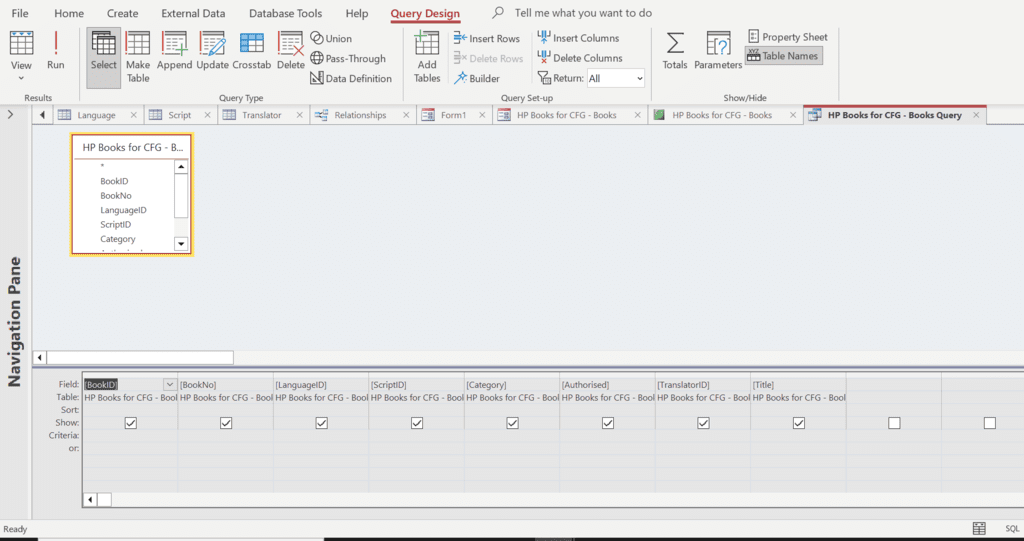Year 11 Exam > Year 11 Notes > IGCSE Information and Communication Technology Preparation > Search & Select Data in Databases
Search & Select Data in Databases | IGCSE Information and Communication Technology Preparation - Year 11 PDF Download
Introduction
- Searching and selecting data in databases is commonly carried out through queries, which can be based on one or multiple criteria.
Using a Single Criterion to Select Subsets of Data
- One way to select specific data is by using a single criterion. For example, you might need to retrieve all customers from a particular city, like selecting all customers from London.
- To achieve this:
- Navigate to the Query Design View.
- Include the table you wish to query.
- Drag the field you want to query into the QBE grid. For example, if you're searching for customers from a specific city, drag the City field.
- Under the Criteria row for this field, input the value you are searching for (e.g., 'London').

Question for Search & Select Data in DatabasesTry yourself: How can you select specific data from a database based on a single criterion?View Solution
Using Multiple Criteria to Select Subsets of Data
- You can apply multiple conditions to filter data in databases. For example, you might need to find all customers from a specific city who made a purchase in the last month.
- To retrieve customers from London who made a purchase in the last 30 days:
- Begin a new query and specify the City field with 'London' as the filter criterion.
- Add another field you wish to query to the query-by-example (QBE) grid. For instance, if you're interested in customers who made a purchase in the last month, drag the LastPurchaseDate field.
- In the Criteria row under this field, input Date()-30.
Using Operators to Perform Searches
- AND: This operator returns true only if both specified conditions are satisfied.
- OR: It returns true if at least one of the specified conditions is met.
- NOT: This operator returns true if the specified condition is not met.
- LIKE: It returns true if the value matches a certain pattern, often used with wildcards for flexibility.
- Comparison Operators: These include >, <, =,="">=, <=,>< />, and they evaluate the comparison between values and return true if the condition holds.
Using Wildcards to Perform Searches
- Definition: Wildcards are utilized with the LIKE operator in database queries to search for patterns.
- Common Wildcard Characters:
- % - Represents zero, one, or multiple characters
- _ - Represents a single character
- Example: To retrieve all customers whose names begin with 'J':
- Begin a new query and place the field you wish to query onto the QBE grid. For instance, if you seek customers whose names begin with 'J', drag the Name field.
- In the Criteria row beneath this field, input J*.
The document Search & Select Data in Databases | IGCSE Information and Communication Technology Preparation - Year 11 is a part of the Year 11 Course IGCSE Information and Communication Technology Preparation.
All you need of Year 11 at this link: Year 11
FAQs on Search & Select Data in Databases - IGCSE Information and Communication Technology Preparation - Year 11
| 1. How can I use a single criterion to select subsets of data in a database? |  |
Ans. You can use the WHERE clause in a SQL query to specify a single criterion for selecting subsets of data in a database. For example, you can use the WHERE clause to select all records where a certain column equals a specific value.
| 2. Is it possible to use multiple criteria to select subsets of data in a database? |  |
Ans. Yes, you can use the AND and OR operators in a SQL query to specify multiple criteria for selecting subsets of data in a database. For example, you can use the AND operator to select records where both criteria are met, or the OR operator to select records where at least one of the criteria is met.
| 3. How can I use operators to perform searches in a database? |  |
Ans. You can use comparison operators such as =, <, >, <=, >=, and <> in a SQL query to perform searches in a database. These operators allow you to compare values in a column to a specified value and retrieve records that match the specified criteria.
| 4. What are wildcards and how can they be used to perform searches in a database? |  |
Ans. Wildcards are characters that can be used to represent one or more other characters in a search string. In SQL, the '%' wildcard represents zero or more characters, while the '_' wildcard represents a single character. You can use wildcards in conjunction with the LIKE operator to perform pattern matching searches in a database.
| 5. What are some common ways to search and select data in databases? |  |
Ans. Some common ways to search and select data in databases include using the WHERE clause with single or multiple criteria, using operators like =, <, >, and LIKE, and using wildcards to perform pattern matching searches. Additionally, you can also use functions and aggregate functions in SQL queries to further refine and manipulate the data you retrieve from a database.
Related Searches




















